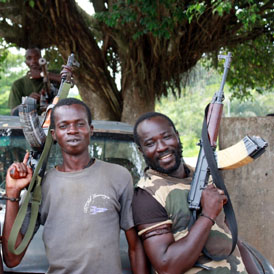Ivory Coast: Ouattara forces deny ‘mass killing’ claims
As Alassane Ouattara’s opposition forces seize Ivory Coast’s capital city, Channel 4 News learns of unverified reports of mass killings close to where his troops are surrounding 10,000 refugees.

On the ground, Alassane Ouattara has seized the official capital Yamoussoukro and said his rival incumbent has just “hours” to leave power peacefully.
The call came as the UN Security Council imposed sanctions, including travel bans and asset freezes on Laurent Gbagbo. The unanimous vote also bans the use of heavy weapons in the commercial capital Abidjan.
Resisting pressure from the African Union and the West, Gbagbo has refused to step down since the disputed election last November, which the United Nations says he lost to Ouattara by an eight-point margin.
Pro-Ouattara fighters – largely made up of former rebels – are reported to have seized the major cocoa port of San Pedro overnight, after Gbagbo’s government had called for an immediate ceasefire and the opening of dialogue.
Killing claims
In the commercial capital Abidjan, pro-Gbagbo youths killed seven civilians when they opened fire in a pro-Ouattara neighbourhood, according to eye-witnesses. And Gbagbo’s militias have also been accused by Human Rights Watch of killing 37 West African immigrants in a village in the west of the country.
But Channel 4 News has learned that there are also unconfirmed – but credible – reports of mass killings by Ouattara forces near the western cocoa belt of Duekoue – where at least 10,000 refugees have been trapped in a church compound with little or no access to food, water or health facilities, according to the International Organisation for Migration.
The refugees are surrounded by thousands of rebel soldiers from Ouattara’s Republican Forces of Ivory Coast (RFCI) and are protected by 1,000 UN peacekeepers, with another 2,000 on the way.
A UN military official on the ground, who asked not be named, told Channel 4 News the situation is still “very, very, very tense, nobody is safe there”.
The official added: “Of course we are hearing reports of atrocities committed by both sides but it is far too early and logistically difficult to verify such claims.”
But, speaking from Dakar, Human Rights Watch’s senior Africa researcher, Corinne Dufka, told Channel 4 News that “there are very credible reports of mass killings recently in the Duekoeu region”.
“There are very credible reports of mass killings recently in the Duekoeu region.” Corinne Dufka, Human Rights Watch
“That area is known as the ‘wild west’ and we are trying to verify these reports as quickly as possible,” she said. “In the west of the country sexual violence peaked in 2004 to an absolutely unacceptable level. After that there has been a political vacuum filled by complete lawlessness.”
Speaking to Channel 4 News from an undisclosed location in Ivory Coast, a spokesman for Ouattara – Konate Siratugui – denied that any war crimes were being committed by the RFCI in Duekoue or in any part of the country.
“What you are seeing is the work of radical forces, Liberian mercenaries working for Gbagbo, they are looting and burning,” he claimed. “They are going house to house terrorising innocent people.”
The Director of the aid agency Medecins Sans Frontieres (MSF), Christopher Stokes, told Channel 4 News that the violence in Duekoeu had escalated at an extremely alarming rate and it was becoming increasingly difficult for the 15 members of his team to operate there.
“In Duekoeu we’re seeing lots of fresh wounded people in the last 24 hours, they’ve been injured by bullet wounds and shrapnel indicating the use of mortar fire,” he said.
The organisation has been working with local doctors in Duekoeu since January when around 4,000 refugees were already there.
“We’re seeing a lot of government and police leaving the area,” he added. “It’s hard to ascribe responsibility to any individual force but a growing number of civilians are being actively targeted. It is very difficult for civilians there.”
Although Ouattara has almost universal international backing – including support from the EU, UN, and US – there are those who vividly remember the level of horror inflicted by his Forces Nouvelle rebels during the 2002-3 civil war.
During that conflict both Ouattara and Gbagbo diverted hundreds of millions of dollars from cocoa fields to fund a conflict marked by torture, sexual violence, and cannibalism – atrocities committed by both sides.
-
Latest news
-
Taylor Swift’s new break-up album breaks records3m

-
NHS trust fined £200K for failings that led to death of two mental health patients3m

-
Sunak vows to end UK ‘sick note culture’ with benefit reform3m

-
‘Loose talk about using nuclear weapons is irresponsible and unacceptable’, says head of UN’s nuclear watchdog3m

-
‘There wasn’t an Israeli attack on Iran,’ says former adviser to Iran’s nuclear negotiations team7m

-




